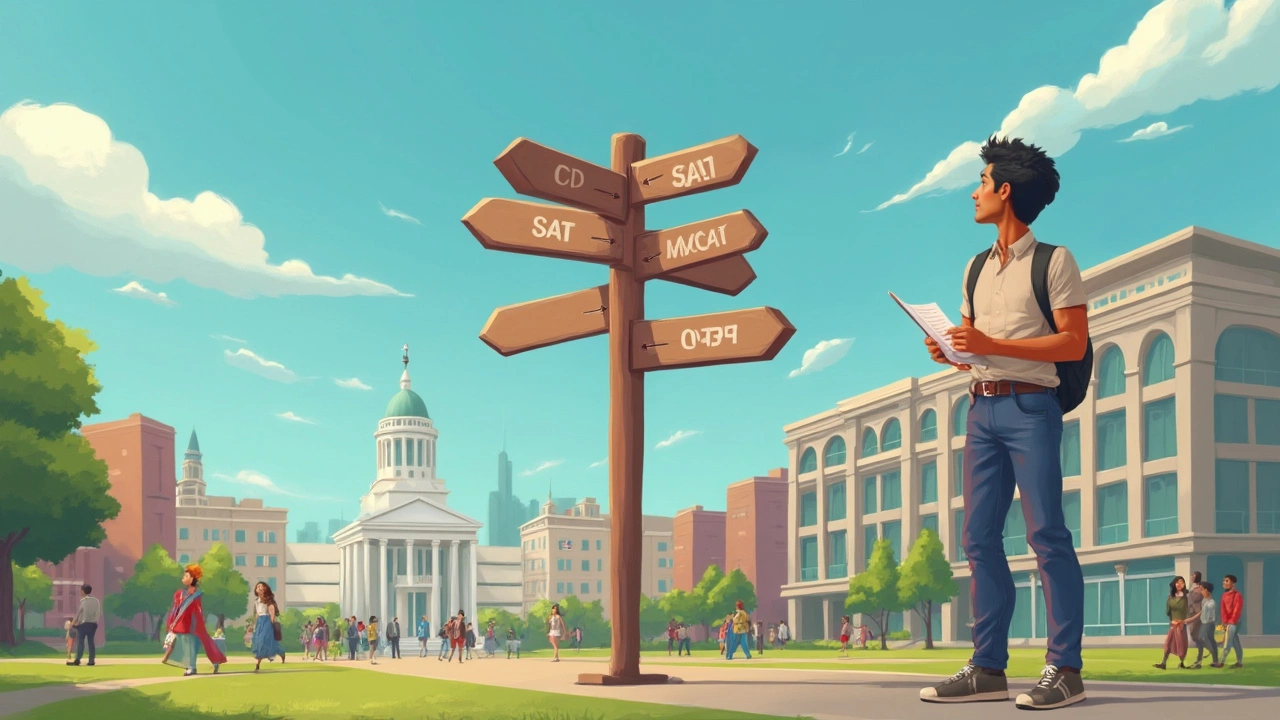Imagine having to sum up your hard work, dreams, and future goals in a single test score. Sounds wild, right? Yet for millions in the United States, this is just part of life. Whether you're eyeing college, grad school, or a professional license, the first big hurdle is always the competitive exam. These tests aren't just about checking what you know. They're giant gates to opportunity, sometimes a test of nerves more than knowledge. But hey, understanding these exams and how to approach them can make the difference between doors slamming shut or swinging wide open.
Types of Competitive Exams in the USA
The United States doesn’t run on one-size-fits-all tests. Walk into a high school or a medical school, and you’ll see a dizzying menu of assessments. Let’s break this mess down.
High schoolers get the SAT or ACT thrown at them if college is the next step. The difference? SAT leans on reasoning and evidence-based skills, while ACT tosses in a science section alongside math, reading, and English. Some try both. Each test keeps evolving; for example, SAT just ditched its essay section and shrank down the test time to make the experience less grueling.
Then there are Advanced Placement (AP) exams. These can replace some college credits if you score high. The International Baccalaureate (IB) exams are similar but with a global flair and a reputation for being tough as nails.
Thinking about grad school? You’ll face the GRE if you’re headed for a master’s or PhD, unless it’s business school, in which case you might need the GMAT. Law’s your calling? The LSAT is infamous for its logic games that have stumped even some seasoned lawyers. Med school hopefuls need to conquer the MCAT, a marathon of bio, chem, and critical reasoning. Dental and pharmacy students get their own beasts: DAT and PCAT, respectively.
And what about those aiming for professional licenses? Teachers often take the Praxis, while doctors face the USMLE (with three separate steps just to call yourself an MD). Nurses tackle the NCLEX, and accountants gear up for the CPA exam. The bar exam, a nail-biter for lawyers, is still seen as one of the hardest professional exams worldwide, with some states boasting pass rates below 50%.
Let’s not forget the armed forces—ASVAB is the test that determines if you’ll even get past the recruiter’s desk for the US military. Want to work for the federal government? Civil service exams are your thing. Immigrants face the USCIS civics test for citizenship, which, funny enough, about half of US-born citizens fail when they try it for fun.
With so many exams, it’s smart to be strategic about which ones you tackle—and when.
Why Do Competitive Exams Matter So Much?
You might wonder why so much rides on a number from a single day. Well, one exam can change your story. College acceptance? Test scores decide who gets a shot at Ivy League and who ends up scrambling for a spot elsewhere. For scholarships, many organizations use SAT or ACT stats as the first filter. You could have a 4.0 GPA, but one bad day in a test may make a world of difference.
Super-tough professional exams come with massive stakes. Take the USMLE Step 1 for doctors—until recently, your score predicted what specialty and residency you’d get, almost like your fate was set in ink. Some banks and finance firms still use GMAT results to sort out resumes before interviews. For foreign-trained professionals, passing American licensing exams is more than a box-tick; it’s the key to actually working in the country.
Even the military uses exams as a sorting hat. The ASVAB not only checks if you qualify for enlistment, but your scores can boost you into competitive roles or keep you stuck in the less exciting stuff.
Here’s the kicker: some schools and employers are rethinking standardized tests. COVID-19 forced a lot of colleges to go test-optional, shaking up the system. Now, many are sticking with it, but a 2024 survey found about 55% of selective universities brought back at least one required test after seeing drops in applicant performance. It keeps changing, but tests aren’t going away soon.
Bottom line, the US loves using exams as the fairest, if imperfect, shot at sifting through mountains of talent (and paperwork).

Popular Exams You Should Know About
Let’s dig into some of the big-name *competitive exams USA* throws at students and professionals:
- SAT & ACT: About 1.7 million students took the SAT in 2024, with the ACT seeing about 1.2 million takers—imagine a packed football stadium, 17 times over.
- AP Exams: In 2024, over 4.4 million AP exams were administered, with some students taking four or five in a single season. College Board, who runs AP and SAT, makes a tidy profit—reportedly just shy of $1 billion in revenue per year.
- GRE: GRE registrations keep climbing, especially among international students gunning for US grad schools. The test now takes under two hours after a recent (and much-needed) overhaul.
- MCAT: Roughly 95,000 students braced for the seven-hour, four-section slog in 2024. This test measures not just book smarts but if you can think on your feet under pressure.
- USMLE: Becoming a US doctor means passing three horrendously tough exams. Step 1, Step 2, and Step 3 scatter across med school years—with thousands of students re-taking after failing the first shot. Passing rates hover around 96% for US grads on Step 1, but much lower for international applicants.
- CPA and Bar Exams: Just under 50% pass the CPA on their first try, and some state bar exams have even lower rates. California’s bar exam pass rate sometimes dips below 40%. Persistence is key.
Here’s a handy table that rounds up some numbers:
| Exam | 2024 Test Takers (Approx.) | Passing Rate |
|---|---|---|
| SAT | 1.7 Million | Varies (Scaled 400-1600) |
| ACT | 1.2 Million | Varies (Scaled 1-36) |
| AP Exams | 4.4 Million | Over 60% Score 3+ |
| GRE | 430,000 | No Pass/Fail |
| MCAT | 95,000 | Approximately 80% Matriculate |
| USMLE Step 1 | 43,000 | 96% (US Grads) |
| CPA | 100,000 | ~50% (First Time) |
| Bar Exam (CA) | 9,000 | ~40% |
Ever wonder why these tests get harder every year? It’s to keep the results meaningful, especially as prep courses and free resources make it easier to game the system. So, every couple of years, test makers shuffle up formats, scoring, and question types just to stay one step ahead. Always check for the latest updates from test websites before you commit your time or money.
Best Strategies to Prepare and Succeed
Just staring at a test prep book won’t cut it. The key is working smarter, not longer. Those who ace these competitive exams usually have a clear study plan and stick to it like it’s part of their job. Craft your plan around your own weaknesses—don’t just memorize what you already know.
One useful tip is to take full-length practice tests under real conditions—set a timer, turn off your phone, and try to get into the groove. This will save you from getting caught off guard by how long most of these tests really are. Did you know the MCAT is as long as watching four Avengers movies back-to-back? If you can’t sit still through a practice, you’ll struggle on the real thing.
Joining a study group helps you stay motivated, especially when burnout creeps in. Some studies show students in groups outperform lone wolves because teaching others locks the info in deeper. Online forums and Reddit communities for specific exams can be a goldmine for secret tips, timing tricks, and real-world practice questions.
If money is tight, look for scholarships tied to test scores, or prep programs offered free by schools and local libraries. Khan Academy offers official SAT prep with practice questions straight from test makers, totally free. Be wise with paid prep—expensive doesn’t always mean better. Sometimes the best materials are the simple, official guides, or what past test takers share in forums.
Don’t ignore health: lack of sleep before a big exam is a top predictor of bad performance (and higher test day anxiety). Hydrate, eat real food, and chill out a little the night before. Many test-takers crash hard after pulling all-nighters and regretting it for months after.
Lastly, always double-check your admission ticket requirements—some test centers are stricter than airport security. A friend once forgot his ID for the GMAT and lost his testing fee, so don’t be that person.

How Competitive Exams Shape Opportunities in the USA
Competitive exams in the USA don’t just sort people for schools and jobs—they shape the country’s culture of competition and achievement. The pressure starts early. Kids as young as middle schoolers start prepping for selective high schools or talent programs, hoping for a good shot at future opportunities.
The upside? If you’ve got grit, you can stand out even if your high school is tiny or your background is modest. Tests can level the playing field, at least in theory. Scholarships tied to scores open doors for students who might not have other ways in. Some of the most competitive scholarships—like the National Merit or Coca-Cola Scholarship—are handed out to those with top percentiles.
But there’s lots of debate. Some critics say these tests fuel inequality, since families with money shell out for expensive tutors or multiple attempts. Others argue they’re still better than pure grade-based admissions, which can be wildly inconsistent between schools.
Yet across the US, exams continue to decide who gets into med school, who gets a law license, or who moves up the corporate ladder. If you plan to live and work in the US, understanding—and mastering—this exam system is almost as important as any subject you’ll study.
So, if you’re someone who’s about to face one of these tests, it helps to see it not only as another hurdle, but as a shot at something bigger—proving you can hang with the toughest crowd. Once you know the rules, you can start playing—and winning—the game.






Write a comment: